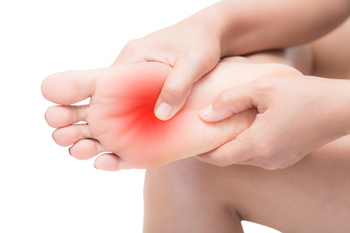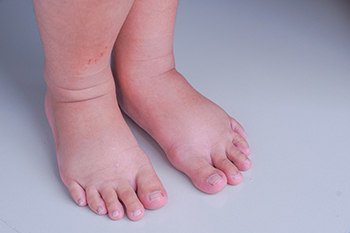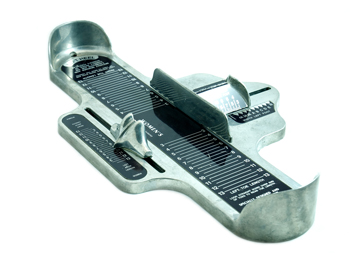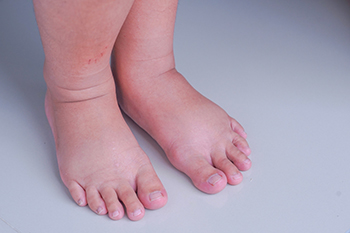Items filtered by date: September 2023
MLS Treatment for Diabetic Peripheral Neuropathy

Diabetic peripheral neuropathy is a common complication of type 1 and 2 diabetes. It occurs when high blood sugar levels damage the nerves extending from the brain and spinal cord to various body parts, including the feet. This condition primarily affects the peripheral nerves, which control sensations and movements in the arms, legs, hands, and feet. Characteristics of diabetic peripheral neuropathy are numbing and tingling sensations, loss of feeling in affected areas, and burning or shooting pain. Additional symptoms include muscle weakness, coordination problems, or foot and leg complications. Treatment options may consist of medications to manage pain, exercise to improve strength and coordination, and lifestyle modifications to prevent complications. Studies suggest that low-level laser therapy for peripheral neuropathy may improve pain and other symptoms, such as sensory function. Laser therapy has also been shown to increase foot temperature, suggesting improved microcirculation. If you suffer from diabetic neuropathy, make an appointment with a podiatrist to discuss which treatment is best for you.
Neuropathy
Neuropathy can be a potentially serious condition, especially if it is left undiagnosed. If you have any concerns that you may be experiencing nerve loss in your feet, consult with Patrice Antero, DPM from Tuscany Podiatry. Our doctor will assess your condition and provide you with quality foot and ankle treatment for neuropathy.
What Is Neuropathy?
Neuropathy is a condition that leads to damage to the nerves in the body. Peripheral neuropathy, or neuropathy that affects your peripheral nervous system, usually occurs in the feet. Neuropathy can be triggered by a number of different causes. Such causes include diabetes, infections, cancers, disorders, and toxic substances.
Symptoms of Neuropathy Include:
- Numbness
- Sensation loss
- Prickling and tingling sensations
- Throbbing, freezing, burning pains
- Muscle weakness
Those with diabetes are at serious risk due to being unable to feel an ulcer on their feet. Diabetics usually also suffer from poor blood circulation. This can lead to the wound not healing, infections occurring, and the limb may have to be amputated.
Treatment
To treat neuropathy in the foot, podiatrists will first diagnose the cause of the neuropathy. Figuring out the underlying cause of the neuropathy will allow the podiatrist to prescribe the best treatment, whether it be caused by diabetes, toxic substance exposure, infection, etc. If the nerve has not died, then it’s possible that sensation may be able to return to the foot.
Pain medication may be issued for pain. Electrical nerve stimulation can be used to stimulate nerves. If the neuropathy is caused from pressure on the nerves, then surgery may be necessary.
If you have any questions, please feel free to contact our office located in Tuscaloosa, AL . We offer the newest diagnostic and treatment technologies for all your foot care needs.
Understanding the Causes of Foot Pain During Pregnancy

Pregnancy is a remarkable journey that brings joy and anticipation. However, along with the many changes within the body, some discomforts can arise, including foot pain. This type of pain is common, and understanding its causes can help expectant mothers better manage it. One of the primary reasons for foot pain during pregnancy is the increased weight and pressure placed on the feet. As the baby grows, so does the strain on the feet which could lead to arch and heel pain. Hormonal changes also play a role, as they can cause ligaments to become more relaxed, leading to instability in the feet. Swelling, a common pregnancy symptom, can also contribute to foot pain. Fluid retention causes the feet to swell, which can lead to discomfort and pressure on the arches. Finally, changes in gait and posture during pregnancy can lead to altered weight distribution, potentially causing pain in various areas of the feet. In conclusion, foot pain during pregnancy is a common but manageable issue. Understanding its causes can empower expectant mothers to take steps to alleviate discomfort and ensure a more pleasant pregnancy experience. If you would like to have additional information about foot pain during pregnancy, it is suggested that you consult a podiatrist.
Pregnant women with swollen feet can be treated with a variety of different methods that are readily available. For more information about other cures for swollen feet during pregnancy, consult with Patrice Antero, DPM from Tuscany Podiatry. Our doctor will attend to all of your foot and ankle needs.
What Foot Problems Can Arise During Pregnancy?
One problem that can occur is overpronation, which occurs when the arch of the foot flattens and tends to roll inward. This can cause pain and discomfort in your heels while you’re walking or even just standing up, trying to support your baby.
Another problem is edema, or swelling in the extremities. This often affects the feet during pregnancy but tends to occur in the later stages.
How Can I Keep My Feet Healthy During Pregnancy?
- Wearing orthotics can provide extra support for the feet and help distribute weight evenly
- Minimize the amount of time spent walking barefoot
- Wear shoes with good arch support
- Wear shoes that allow for good circulation to the feet
- Elevate feet if you experience swelling
- Massage your feet
- Get regular, light exercise, such as walking, to promote blood circulation to the feet
If you have any questions please feel free to contact our office located in Tuscaloosa, AL . We offer the newest diagnostic and treatment technologies for all your foot and ankle needs.
Proper Shoe Fitting With the Brannock Device

In the world of footwear, there is an indispensable tool known as the Brannock Device. This metal device, patented in 1927 by Charles F. Brannock, has revolutionized how we select and fit shoes. Its significance lies in its ability to provide an accurate measurement of the length and width of one's feet, ensuring that shoes fit properly and comfortably. Proper shoe fitting is more than just a matter of comfort, it is essential for overall foot health. Ill-fitting shoes can lead to problems ranging from blisters and calluses to bunions and posture problems. The Brannock device helps patients and footwear professionals find the perfect fit, promoting proper foot health and preventing future discomfort. If you would like additional information about the Brannock device, it is suggested that you confer with a podiatrist.
Finding a properly-fitting shoe is important in reducing injuries and preventing foot problems. For more information about treatment, contact Patrice Antero, DPM from Tuscany Podiatry. Our doctor will treat your foot and ankle needs.
Proper Shoe Fitting
A common concern when it comes to foot health, having properly fitted shoes can help prevent injuries to the foot. Out feet affect our posture and gait, which in turn affects the biomechanics and overall bodily structure. With 33 joints, 26 bones, and over 100 ligaments, the potential for serious injury is much greater than one realizes. Although the feet cease growth in adulthood, they still change shape as they mature. Here are some factors to consider when it comes to investing in proper fitting shoes:
- Be sure the shoes fit correctly right away
- Ensure the ball of your foot fits comfortably in the widest portion of the shoes
- Even though they may look fashionable, improper fitting shoes can either create adverse conditions or exacerbate existing ones you may already have
- Walk along a carpeted surface to ensure the shoes comfortably fit during normal activity
Keeping in mind how shoes fit the biomechanics of your body, properly-fitting shoes are vitally important. Fortunately, it is not difficult to acquire footwear that fits correctly. Be sure to wear shoes that support the overall structure of your body. Do your feet a favor and invest in several pairs of well-fitted shoes today.
If you have any questions please feel free to contact our office located in Tuscaloosa, AL . We offer the newest diagnostic and treatment technologies for all your foot and ankle needs.
Common Causes of Swollen Feet

Swollen feet, while often benign, can be discomforting and may point to an underlying issue. Various factors can contribute to this condition. Prolonged standing or sitting, especially in one position, can impede proper blood circulation, leading to fluid accumulation and swelling. Wearing inadequate footwear, whether too tight or unsupportive, can restrict blood flow and aggravate the problem. Medical conditions such as hypertension or kidney disease can cause fluid retention in the lower extremities. Pregnancy also plays a role due to increased pressure on blood vessels and hormonal shifts. Injuries like sprains or fractures can trigger inflammation and swelling as part of the body's healing response. Recognizing the cause of swollen feet is important for effective management. Elevating your feet, staying hydrated, and engaging in a consistent exercise routine can be helpful. However, persistent or severe swelling demands medical attention to address the root cause. If you have swollen feet, it is suggested that you are under the care of a podiatrist who can help you to manage this condition.
Swollen feet can be a sign of an underlying condition. If you have any concerns, contact Patrice Antero, DPM of Tuscany Podiatry. Our doctor can provide the care you need to keep you pain-free and on your feet.
Swollen feet are a common ailment among pregnant women and people who stand or sit for extended periods. Aging may increase the possibility of swollen feet and patients who are obese often notice when their feet are swelling too. There may be medical reasons why swollen feet occur:
- Phlebitis - A condition that causes the veins to become inflamed and can also cause leg pain.
- Liver disease - This may lead to low blood levels of albumin which is a protein. This can cause fluid in the blood to pass into the tissues and several areas of the body can become swollen.
- Heart failure - When the heart doesn’t pump properly the blood that is normally pumped back to the heart can pool in the veins of the legs causing swollen feet.
- Kidney disease - One of the main functions of the kidneys is releasing excess fluid in the body. This type of condition can make it difficult for the kidneys to function properly, and as a result the feet may become swollen.
- Deep-vein thrombosis (DVT)- This is a serious condition where blood clots form in the veins of the legs. They can block the return of blood from the legs to the heart which may cause the feet to swell. It is important to be treated by a podiatrist if this condition is present.
Swollen feet can also be caused by bone and tendon conditions, including fractures, arthritis, and tendinitis. Additionally, there may be skin and toenail conditions and an infection may cause the feet to swell. Patients who take medicine to treat high blood pressure may be prone to getting swollen feet.
Many patients elevate their feet to help relieve the swelling and this is generally a temporary remedy. When a podiatrist is consulted the reason behind the swelling can be uncovered and subsequently treated.
If you have any questions please feel free to contact our office located in Tuscaloosa, AL . We offer the newest diagnostic tools and technology to treat your foot and ankle needs.



